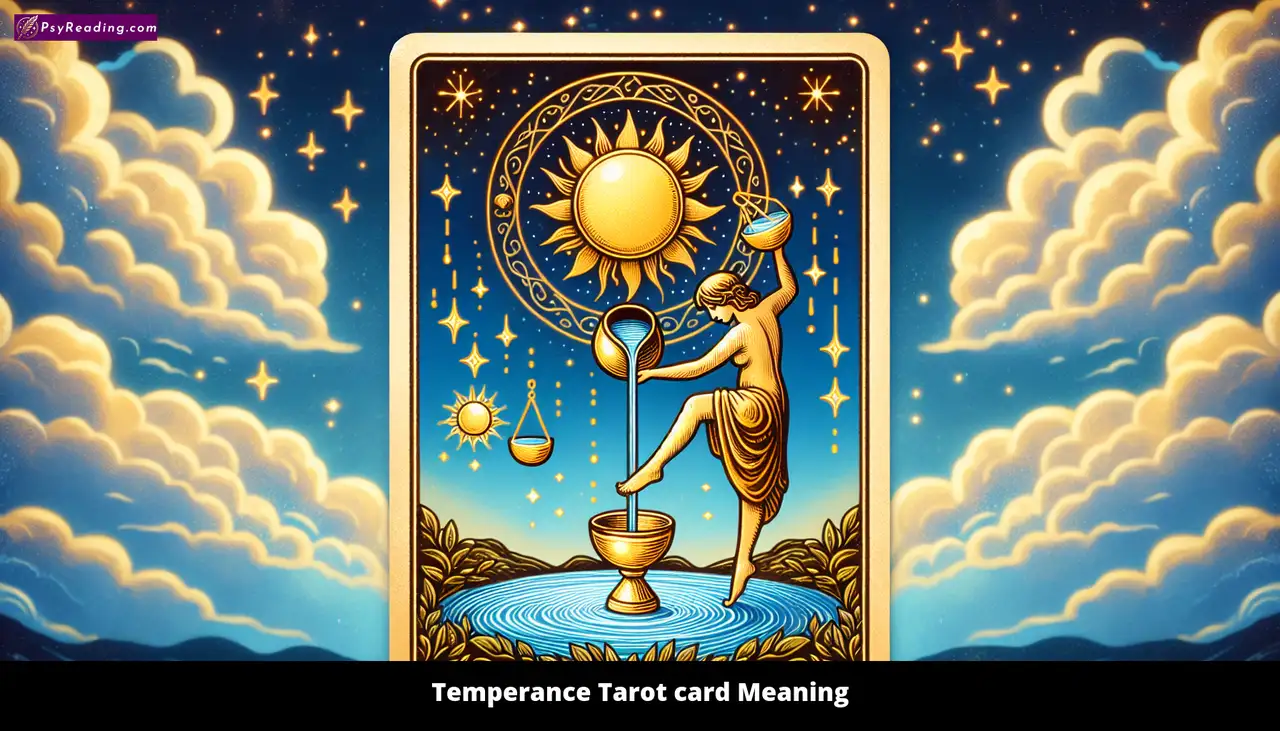Temperance, often associated with restraint and moderation, holds a profound and transformative meaning in the realm of tarot. As the 14th tarot card, Temperance symbolizes balance, harmony, and synthesis. It invites us to delve into our inner selves, encouraging equilibrium in our thoughts, emotions, and actions. Understanding the Temperance Tarot card can offer valuable insights into your life’s journey, highlighting the beautiful blend of opposites and the creation of something harmonious.
Contents
- 1 What Does the Temperance Tarot Card Represent in a Reading?
- 2 How is Temperance Interpreted in Different Situations?
- 3 How Does Temperance Influence Personal Growth and Spiritual Guidance?
- 4 What is the Role of Temperance in Decision Making?
- 5 How Does Temperance Affect Emotional Balance and Inner Peace?
- 6 What is the Connection Between Temperance and Life Transitions?
- 7 What Does Temperance Symbolize?
- 8 How is Temperance Interpreted When Reversed?
- 9 What is the Meaning of the Temperance Tarot Card in a Spiritual Context?
- 10 How Does Temperance Relate to Personal Development and Self-Improvement?
- 11 What is the Meaning of the Devil Tarot Card, the Antonym of Temperance?
What Does the Temperance Tarot Card Represent in a Reading?
The Temperance Tarot card embodies balance, moderation, and patience. It encourages seekers to find harmony in their lives by blending opposing elements and practicing self-restraint. This card signifies healing, tranquility, and the synthesis of dualities, suggesting that you are on a path to achieving inner peace and alignment with your purpose.
When Temperance appears in a reading, it’s a reminder to take the middle path, avoid extremes, and maintain calmness even during challenging times. It indicates a period of recovery and rejuvenation, urging you to restore balance in areas where it’s needed.
How is Temperance Interpreted in Different Situations?
The meaning of Temperance can vary depending on the context of the reading:
- Love and Relationships: Indicates a balanced and harmonious partnership. It suggests patience in resolving conflicts and the presence of a soulmate connection.
- Career and Work: Signifies a balanced approach to professional life. It may suggest finding a middle ground or compromise in work situations.
- Health and Wellness: Encourages a balanced lifestyle, including moderation in diet and exercise. It also emphasizes emotional balance as part of overall well-being.
- Financial Situations: Highlights the importance of wise spending, thoughtful investments, and patience in achieving financial stability.
How Does Temperance Influence Personal Growth and Spiritual Guidance?
Temperance plays a crucial role in personal development by promoting balance, patience, and moderation. It encourages introspection and self-control, helping individuals achieve a higher state of consciousness. By blending opposing forces within oneself, Temperance fosters inner peace and spiritual enlightenment, guiding you toward personal growth and transformation.
What is the Role of Temperance in Decision Making?
In decision-making, Temperance advises taking a balanced and measured approach. It encourages you to assess situations calmly, avoid impulsive actions, and consider the long-term consequences of your choices. By finding the middle ground, you can make decisions that bring harmony and contribute to your overall well-being.
How Does Temperance Affect Emotional Balance and Inner Peace?
Temperance symbolizes the harmonious blending of emotions, promoting inner peace and stability. It teaches patience and encourages you to manage your emotions effectively, avoiding extreme reactions. This balance leads to a calm and centered state of mind, enhancing your ability to handle stress and maintain emotional equilibrium.
What is the Connection Between Temperance and Life Transitions?
During significant life transitions, Temperance guides you to embrace change with grace and patience. It encourages you to reassess your goals, make necessary adjustments, and find harmony amidst the shifts. This card signifies transformation and adaptation, reminding you that balance is essential during periods of change.
What Does Temperance Symbolize?
Temperance is often depicted as an angel blending water between two cups, representing the balance between the material and spiritual worlds. This imagery signifies the flow of life, the importance of flexibility, and the harmonious integration of opposites. The card is a beacon of peace and serenity, highlighting the transformative power of moderation.
How is Temperance Interpreted When Reversed?
When reversed, Temperance indicates imbalance, excess, and a lack of long-term vision. It suggests that you may be acting impulsively, leading to disharmony in your life. Key interpretations include:
- Imbalance: Overindulgence in certain areas, disrupting harmony.
- Excess: Overdoing things, resulting in stress and burnout.
- Lack of Long-Term Vision: Making hasty decisions without considering future consequences.
A reversed Temperance card urges you to restore balance, take a step back, and reassess your actions to regain harmony.
What is the Meaning of the Temperance Tarot Card in a Spiritual Context?
Spiritually, Temperance represents the integration of opposites and the pursuit of inner harmony. It encourages patience and self-control, fostering personal transformation and enlightenment. This card signals a time for inner reflection and aligning with your higher self, promoting spiritual growth and tranquility.
How Does Temperance Relate to Personal Development and Self-Improvement?
Temperance is a guide for personal development, emphasizing the importance of balance and moderation in self-improvement efforts. It encourages steady, incremental progress and the blending of various aspects of your life to achieve holistic growth. By fostering inner peace and patience, Temperance supports continuous self-improvement and personal transformation.
What is the Meaning of the Devil Tarot Card, the Antonym of Temperance?
The Devil Tarot card, opposite to Temperance, symbolizes materialism, addiction, and bondage. It represents being trapped by desires and superficialities, leading to a loss of freedom and self-control. This card challenges you to confront your obsessions and unhealthy habits, urging you to seek liberation and break free from self-imposed constraints.
While Temperance signifies balance and moderation, the Devil card serves as a reminder of the dangers of excess and the importance of maintaining control over your desires. It encourages self-examination to overcome dependencies and achieve true freedom.

